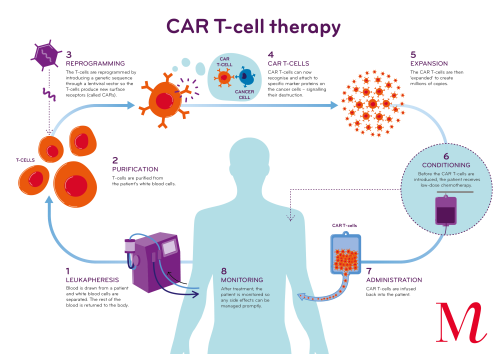CAR T-Cell Therapy, A Revolutionary Step in Cancer Treatment

CAR T-Cell Therapy, A Revolutionary Step in Cancer Treatment
In recent years, Chimeric Antigen Receptor CAR T-cell therapy has become one of the most groundbreaking innovations in cancer treatment. This advanced form of immunotherapy is transforming the treatment of certain blood cancers like leukemia and lymphoma, offering patients new hope when other options are limited.
What is CAR T-Cell Therapy?
-
CAR T-cell therapy utilizes the body’s own immune system to target and eliminate cancer cells. The procedure begins by extracting T-cells, a vital type of white blood cell that plays a central role in immune defense, from the patient’s blood. These T-cells are then genetically engineered in a laboratory to express a chimeric antigen receptor (CAR) on their surface. This receptor is specifically designed to identify a unique protein present on the surface of cancer cells.
-
Once modified and multiplied, the engineered CAR T-cells are reintroduced into the patient's bloodstream. Now equipped with the ability to recognize cancer-specific antigens, these T-cells directly target and destroy the cancer cells, sparing healthy tissue and enhancing the precision of the treatment.
The Science Behind CAR T-Cell Therapy :
-
The key to CAR T-cell therapy’s success is its ability to genetically modify T-cells to recognize and fight cancer. Normally, T-cells can identify and attack infected or abnormal cells. However, they often fail to recognize cancer cells, as tumors can evade detection. By adding the CAR, T-cells gain the ability to specifically target and attack cancer cells, making them much more effective in the battle against cancer.
-
The engineered receptors are designed to recognize cancer-specific proteins, typically found in high quantities on cancer cells but not on healthy cells. For instance, in some cases of leukemia, CAR T-cells target CD19, a protein found on the surface of B-cells, including the cancerous ones. By targeting this protein, CAR T-cells can selectively destroy the cancerous B-cells while leaving healthy cells unharmed.
Clinical Success and Applications
-
CAR T-cell therapy has shown remarkable results in treating blood cancers, including acute lymphoblastic leukemia (ALL) and non-Hodgkin lymphoma. Several CAR T-cell treatments have received approval from regulatory bodies, such as the U.S. Food and Drug Administration (FDA). Treatments like Kymriah and Yescarta have proven highly effective, particularly in patients whose cancers have relapsed or are resistant to traditional therapies, offering these patients a renewed chance at remission.
-
The potential of CAR T-cell therapy is expanding beyond blood cancers. Researchers are actively working to adapt the treatment for solid tumors, which present more complex challenges. Solid tumors, such as those found in lung, breast, and pancreatic cancers, are harder to treat due to their immune-suppressive environment and dense structure. However, ongoing advancements offer hope for expanding CAR T-cell therapy’s use to solid tumors in the future.
Benefits and Challenges Benefits:
-
Targeted Action: CAR T-cell therapy targets only the cancerous cells, unlike traditional chemotherapy, which affects both healthy and cancerous cells. This precision reduces collateral damage to healthy tissues.
-
Durable Remissions: Many patients experience long-lasting remissions, sometimes after just one infusion of CAR T-cells, especially those with aggressive or relapsed cancers.
-
Personalized Treatment: Since CAR T-cells are derived from the patient’s own body, the therapy is highly personalized, increasing its effectiveness and minimizing rejection.
Challenges:
-
Side Effects: As with any cancer treatment, CAR T-cell therapy can lead to side effects. Common and serious ones include cytokine release syndrome (CRS), a severe immune response, and neurological toxicities that can result in confusion, seizures, or even coma. Managing these side effects is crucial to the therapy’s success.
-
Cost and Accessibility: The therapy is expensive, requiring specialized lab work and intensive hospital care, making it financially challenging for some patients. Efforts are underway to reduce costs and make the treatment more accessible.
-
Long-Term Outcomes: While CAR T-cell therapy has shown impressive short-term results, further research is needed to understand its long-term effectiveness and whether the cancer may return after treatment.
Conclusion
CAR T-cell therapy is a revolutionary advancement in cancer treatment, particularly for blood cancers that were once considered nearly untreatable. With ongoing research and breakthroughs, CAR T-cell therapy has the potential to significantly improve cancer outcomes and reshape the entire landscape of cancer treatment. As we witness its continued success in clinical trials, the future of cancer therapies looks increasingly hopeful for patients worldwide.
Research URL :- https://www.wae.guru/wall/blogs/10445/CAR-T-Cell-Therapy-A-Revolutionary-Step-in-Cancer-Treatment
- Art
- Causes
- Crafts
- Dance
- Drinks
- Film
- Fitness
- Food
- Oyunlar
- Gardening
- Health
- Home
- Literature
- Music
- Networking
- Other
- Party
- Religion
- Shopping
- Sports
- Theater
- Wellness


